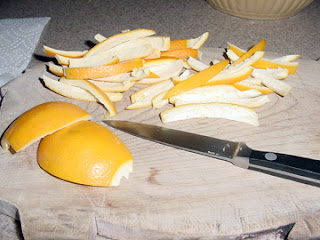Last year around this time I came across an old recipe for glaceed apricots and having found a source for very good dried ones decided to try my hand at recreating this treat. They were close. Very close. Partially dipping some of them in dark chocolate didn't hurt either. I decided to definitely add them to my repertoire of holiday treats. This year I wanted to add candied peel as well.
There are tons of candied peel recipes out there on the web and in cookbooks, especially the older ones. When citrus was a seasonal treat and not an everyday grocery store purchase, moms and grandmas urged careful peeling of the fruits so they could dry, candy and store the rinds for other uses. Waste not, want not. I gleaned tips, times and ratios from these recipes to come up with my method for candied peel.
I started out with a bag of 12 naval oranges. I chose navels because I wanted an orange with a good thick rind. I gave each orange a good scrubbing and thorough drying and then proceeded to carefully remove the peels. I cut the stem and blossom ends off each fruit so I could see where the pith ended and the meat began, scored the rinds in quarters without cutting into the meat, and carefully peeled it off.
Many of the recipes say to remove as much of the white pith as possible but I remembered the peel having a bit of a bitter marmalade taste so I left all of the pith on. Once the rind was removed I sliced it into roughly quarter inch strips. While I was doing this Michael juiced all the navals, giving us each a big 8 ounce glass of juice to enjoy. I don't know if it's because we've been nursing colds or because fresh pressed juice itself is a luxury but those glasses tasted really good!
I ended up with enough peel for two batches. Of all the recipes I looked at, every one talked only of making plain peel. None of them said anything of spicing the syrup to add a little extra oomph. So I decided to do one batch of traditional peel and spice the simple syrup for the second batch. I thought of a tropical flavor with hints of ginger and vanilla bean but I was out of ginger root. Then I thought of a spicy chili blend and from there went to an Asian blend with tamari, ginger, honey, and a touch of red pepper rolled in toasted sesame seeds. To keep it simple I went for the chili blend. But I may have to get a few more oranges and try the Asian one!
The first step is to place the prepared rind in a large non-reactive pot and cover it with cold water. Bring the pot to the boil and then pour the water off. Repeat this step two more times. This removes much of the bitterness from the peel.
The syrup is a basic simple syrup with a ratio of 1:1 sugar to water. You want to make enough to amply cover your peel. I did 4:4 per batch. Combine the sugar and water in a heavy non-reactive pot and bring to a boil over medium-high heat. As soon as it has reached the boil take the pot off the heat, turn it down to medium-low, carefully stir the peel into the hot syrup and return to the heat. Adjust the heat so the peel cooks at a low simmer until it turns translucent. The usual time for this is about an hour but since I chose to keep the pith my peel was much thicker and it took about an hour and a half. Stir occasionally while the peel simmers.
 |
| Plain peel at translucent stage with syrup reduced |
 |
| Spicy chili flavored peel. See the red flecks? |
Next, remove the peel from the syrup with a slotted spoon and either spread out on racks or place in a colander to drain. If you like, reserve the now orange flavored syrup for another use. You can use it to sweeten tea or cocktails, mix a few tablespoons with fizzy water for a "soda", drizzle it over a spice cake or gingerbread, poach pears in it, lots of uses.
At this point, turn your oven on to 200F and line some sheets with parchment paper. I chose to use the dehydrator set at 135F. Pour some sugar into a bowl. I used a large grained white sugar for the plain peel and a mix of red and orange sanding sugars for the spiced peel but regular granulated sugar will do. Once the peel has drained, dredge the sticky peel in the sugar and lay it out in a single layer on the parchment sheets or dehydrator racks. Tap off any excess sugar before placing them on the racks or sheets.
 |
| Plain peel in crunchy large grained sugar. |
 |
| Spicy Chili peel in red and orange sanding sugar |
When the rinds are dry, remove from the dehydrator or oven and allow to cool completely. Tap off any excess sugar again and pack in an airtight container.
 |
| Finished plain peel |
 |
| Finished Spicy Chili peel |
Now I'm really looking forward to making those apricot jewels!




No comments:
Post a Comment